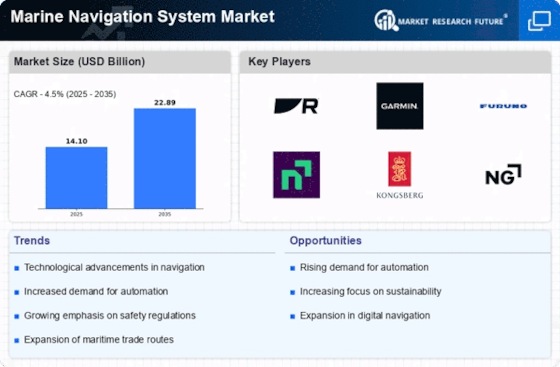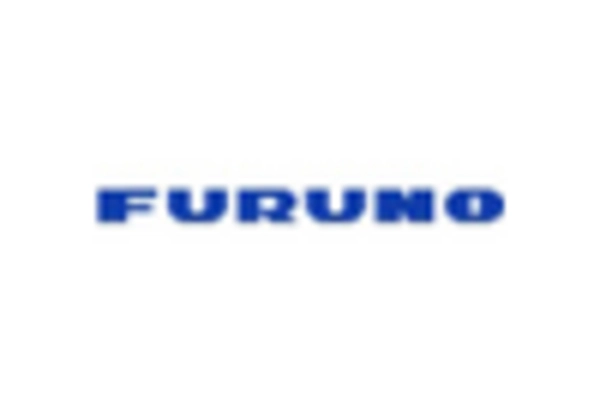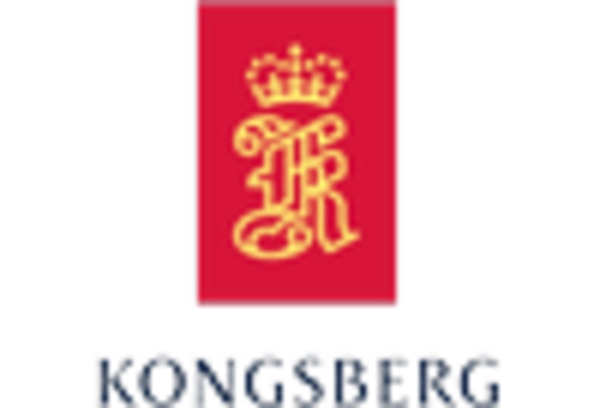-
Executive Summary
-
Market Attractiveness Analysis
- Global Marine Navigation System Market, By Type
- Global Marine Navigation System Market, By End Use
- Global Marine Navigation System Market, By Application
- Global Marine Navigation System Market, By Region
-
Market Introduction
-
Market Definition
-
Scope Of The Study
-
Market Structure
-
Key Buying Criteria
-
Market Factor Indicator Analysis
-
Research Methodology
-
Research Process
-
Primary Research
-
Secondary Research
-
Market Size Estimation
-
Forecast Model
-
List Of Assumptions
-
Market Insights
-
Market Dynamics
-
Introduction
-
Drivers
-
Restraints
-
Opportunities
-
Market/Technological Trends
-
Patent Trends
-
Regulatory Landscape/Standards
-
Market Factor Analysis
-
Value Chain/Supply Chain Analysis
- R&D
- Manufacturing
- Distribution & Sales
- Post-Sales Monitoring
-
Porter’s Five Forces Analysis
- Threat Of New Entrants
- Bargaining Power Of Buyers
- Threat Of Substitutes
- Segment Rivalry
- Bargaining Power Of Supplies
-
Global Marine Navigation System Market, By Type
-
Introduction
-
Chart Plotter
- Market Estimates & Forecast, 2024-2032
- Market Estimates & Forecast, By Region, 2024-2032
-
Electronic Navigation Chart
- Market Estimates & Forecast, 2024-2032
- Market Estimates & Forecast, By Region, 2024-2032
-
Others
- Market Estimates & Forecast, 2024-2032
- Market Estimates & Forecast, By Region, 2024-2032
-
Global Marine Navigation System Market, By End Use
-
Introduction
-
Defense
- Market Estimates & Forecast, 2024-2032
- Market Estimates & Forecast, By Region, 2024-2032
-
Commercial
- Market Estimates & Forecast, 2024-2032
- Market Estimates & Forecast, By Region, 2024-2032
-
Global Marine Navigation System Market, By Application
-
Introduction
-
Commercial Air Transport
- Market Estimates & Forecast, 2024-2032
- Market Estimates & Forecast, By Region, 2024-2032
-
Business And General Aviation
- Market Estimates & Forecast, 2024-2032
- Market Estimates & Forecast, By Region, 2024-2032
-
Military Aviation
- Market Estimates & Forecast, 2024-2032
- Market Estimates & Forecast, By Region, 2024-2032
-
Global Marine Navigation System Market, By Region
-
Introduction
-
North America
- Market Estimates & Forecast, By Country, 2024-2032
- Market Estimates & Forecast, By Type, 2024-2032
- Market Estimates & Forecast, By End Use, 2024-2032
- Market Estimates & Forecast, By Application, 2024-2032
- US
- Canada
-
Europe
- Market Estimates & Forecast, By Country, 2024-2032
- Market Estimates & Forecast, By Type, 2024-2032
- Market Estimates & Forecast, By End Use, 2024-2032
- Market Estimates & Forecast, By Application, 2024-2032
- UK
- Germany
- France
- Italy
- Rest Of Europe
-
Asia-Pacific
- Market Estimates & Forecast, By Country, 2024-2032
- Market Estimates & Forecast, By Type, 2024-2032
- Market Estimates & Forecast, By End Use, 2024-2032
- Market Estimates & Forecast, By Application, 2024-2032
- China
- Japan
- India
- Australia
- Rest Of Asia-Pacific
-
Middle East & Africa
- Market Estimates & Forecast, By Country, 2024-2032
- Market Estimates & Forecast, By Type, 2024-2032
- Market Estimates & Forecast, By End Use, 2024-2032
- Market Estimates & Forecast, By Application, 2024-2032
- Saudi Arabia
- UAE
- Rest Of Middle East & Africa
-
Latin America
- Market Estimates & Forecast, By Country, 2024-2032
- Market Estimates & Forecast, By Type, 2024-2032
- Market Estimates & Forecast, By End Use, 2024-2032
- Market Estimates & Forecast, By Application, 2024-2032
- Brazil
- Rest Of Latin America
-
Competitive Landscape
-
Competitive Overview
-
Competitor Dashboard
-
Major Growth Strategies In The Global Marine Navigation System Market
-
Competitive Benchmarking
-
Market Share Analysis
-
Leading Player In Terms Of Number Of Developments In Global Marine Navigation System Market
-
Key Developments & Growth Strategies
- Product Launch/Service Deployment
- Mergers And Acquisitions
- Joint Ventures
-
Company Profiles
-
Danelec Marine A/S
- Company Overview
- Financial Overview
- Products Offered
- Key Developments
- SWOT Analysis
- Key Strategies
-
FURUNO Electric Co. Ltd.
- Company Overview
- Financial Overview
- Products Offered
- Key Developments
- SWOT Analysis
- Key Strategies
-
Periskal Group
- Company Overview
- Financial Overview
- Products Offered
- Key Developments
- SWOT Analysis
- Key Strategies
-
Northrop Grumman Sperry Marine B.V.
- Company Overview
- Financial Overview
- Products Offered
- Key Developments
- SWOT Analysis
- Key Strategies
-
Wartsila
- Company Overview
- Financial Overview
- Products Offered
- Key Developments
- SWOT Analysis
- Key Strategies
-
Raytheon Anschutz GmbH
- Company Overview
- Financial Overview
- Products Offered
- Key Developments
- SWOT Analysis
- Key Strategies
-
Safran Electronics & Defense
- Company Overview
- Financial Overview
- Products Offered
- Key Developments
- SWOT Analysis
- Key Strategies
-
Honeywell International Inc
- Company Overview
- Financial Overview
- Products Offered
- Key Developments
- SWOT Analysis
- Key Strategies
-
Kongsberg Maritime
- Company Overview
- Financial Overview
- Products Offered
- Key Developments
- SWOT Analysis
- Key Strategies
-
FLIR Systems Inc
- Company Overview
- Financial Overview
- Products Offered
- Key Developments
- SWOT Analysis
- Key Strategies
-
Appendix
-
References
-
Related Reports
-
List Of Abbreviation
-
List Of Tables
-
List Of Assumptions
-
Major Patents Granted For Directed Energy Weapon (15 May 2010–15 May 2019)
-
Type: Global Marine Navigation System Market, 2024-2032(USD Million)
-
End Use: Global Marine Navigation System Market, 2024-2032(USD Million)
-
Application: Global Marine Navigation System Market, 2024-2032(USD Million)
-
Global Marine Navigation System Market, By Region, 2024-2032(USD Million)
-
North America: Marine Navigation System Market, By Country, 2024-2032(USD Million)
-
North America: Marine Navigation System Market, By Type, 2024-2032(USD Million)
-
North America: Marine Navigation System Market, By End Use, 2024-2032(USD Million)
-
North America: Marine Navigation System Market, By Application, 2024-2032(USD Million)
-
US: Marine Navigation System Market, By Type, 2024-2032(USD Million)
-
US: Marine Navigation System Market, By End Use, 2024-2032(USD Million)
-
US: Marine Navigation System Market, By Application, 2024-2032(USD Million)
-
Canada: Marine Navigation System Market, By Type, 2024-2032(USD Million)
-
Canada: Marine Navigation System Market, By End Use, 2024-2032(USD Million)
-
Canada: Marine Navigation System Market, By Application, 2024-2032(USD Million)
-
Europe: Marine Navigation System Market, By Country, 2024-2032(USD Million)
-
Europe: Marine Navigation System Market, By Type, 2024-2032(USD Million)
-
Europe: Marine Navigation System Market, By End Use, 2024-2032(USD Million)
-
Europe: Marine Navigation System Market, By Application, 2024-2032(USD Million)
-
UK: Marine Navigation System Market, By Type, 2024-2032(USD Million)
-
UK: Marine Navigation System Market, By End Use, 2024-2032(USD Million)
-
UK: Marine Navigation System Market, By Application, 2024-2032(Usd Million)
-
Germany: Marine Navigation System Market, By Type, 2024-2032(Usd Million)
-
Germany: Marine Navigation System Market, By End Use, 2024-2032(Usd Million)
-
Germany: Marine Navigation System Market, By Application, 2024-2032(Usd Million)
-
France: Marine Navigation System Market, By Type, 2024-2032(Usd Million)
-
France: Marine Navigation System Market, By End Use, 2024-2032(Usd Million)
-
France: Marine Navigation System Market, By Application, 2024-2032(Usd Million)
-
Italy: Marine Navigation System Market, By Type, 2024-2032(Usd Million)
-
Italy: Marine Navigation System Market, By End Use, 2024-2032(Usd Million)
-
Italy: Marine Navigation System Market, By Application, 2024-2032(Usd Million)
-
Rest Of Europe: Marine Navigation System Market, By Type, 2024-2032(USD Million)
-
Rest Of Europe: Marine Navigation System Market, By End Use, 2024-2032(USD Million)
-
Rest Of Europe: Marine Navigation System Market, By Application, 2024-2032(USD Million)
-
Asia-Pacific: Marine Navigation System Market, By Country, 2024-2032(USD Million)
-
Asia-Pacific: Marine Navigation System Market, By Type, 2024-2032(USD Million)
-
Asia-Pacific: Marine Navigation System Market, By End Use, 2024-2032(USD Million)
-
Asia-Pacific: Marine Navigation System Market, By Application, 2024-2032(USD Million)
-
China: Marine Navigation System Market, By Type, 2024-2032(USD Million)
-
China: Marine Navigation System Market, By End Use, 2024-2032(USD Million)
-
China: Marine Navigation System Market, By Application, 2024-2032(USD Million)
-
India: Marine Navigation System Market, By Type, 2024-2032(USD Million)
-
India: Marine Navigation System Market, By End Use, 2024-2032(USD Million)
-
India: Marine Navigation System Market, By Application, 2024-2032(USD Million)
-
Japan: Marine Navigation System Market, By Type, 2024-2032(USD Million)
-
Japan: Marine Navigation System Market, By End Use, 2024-2032(USD Million)
-
Japan: Marine Navigation System Market, By Application, 2024-2032(USD Million)
-
Australia: Marine Navigation System Market, By Type, 2024-2032(USD Million)
-
Australia: Marine Navigation System Market, By End Use, 2024-2032(USD Million)
-
Australia: Marine Navigation System Market, By Application, 2024-2032(USD Million)
-
Rest Of Asia-Pacific: Marine Navigation System Market, By Type, 2024-2032(USD Million)
-
Rest Of Asia-Pacific: Marine Navigation System Market, By End Use, 2024-2032(USD Million)
-
Rest Of Asia-Pacific: Marine Navigation System Market, By Application, 2024-2032(USD Million)
-
Middle East & Africa: Marine Navigation System Market, By Country, 2024-2032(USD Million)
-
Middle East & Africa: Marine Navigation System Market, By Type, 2024-2032(USD Million)
-
Middle East & Africa: Marine Navigation System Market, By End Use, 2024-2032(USD Million)
-
Middle East & Africa: Marine Navigation System Market, By Application, 2024-2032(USD Million)
-
Saudi Arabia: Marine Navigation System Market, By Type, 2024-2032(USD Million)
-
Saudi Arabia: Marine Navigation System Market, By End Use, 2024-2032(USD Million)
-
Saudi Arabia: Marine Navigation System Market, By Application, 2024-2032(USD Million)
-
UAE: Marine Navigation System Market, By Type, 2024-2032(USD Million)
-
UAE: Marine Navigation System Market, By End Use, 2024-2032(USD Million)
-
UAE: Marine Navigation System Market, By Application, 2024-2032(USD Million)
-
Rest Of The Middle East & Africa: Marine Navigation System Market, By Type, 2024-2032(USD Million)
-
Rest Of The Middle East & Africa: Marine Navigation System Market, By End Use, 2024-2032(USD Million)
-
Rest Of The Middle East & Africa: Marine Navigation System Market, By Application, 2024-2032(USD Million)
-
Latin America: Marine Navigation System Market, By Country, 2024-2032(USD Million)
-
Latin America: Marine Navigation System Market, By Type, 2024-2032(USD Million)
-
Latin America: Marine Navigation System Market, By End Use, 2024-2032(USD Million)
-
Latin America: Marine Navigation System Market, By Application, 2024-2032(USD Million)
-
Brazil: Marine Navigation System Market, By Type, 2024-2032(USD Million)
-
Brazil: Marine Navigation System Market, By End Use, 2024-2032(USD Million)
-
Brazil: Marine Navigation System Market, By Application, 2024-2032(USD Million)
-
Rest Of Latin America: Marine Navigation System Market, By Type, 2024-2032(USD Million)
-
Rest Of Latin America: Marine Navigation System Market, By End Use, 2024-2032(USD Million)
-
Rest Of Latin America: Marine Navigation System Market, By Application, 2024-2032(USD Million)
-
The Most Active Players In The Global Marine Navigation System Market
-
Contracts And Agreements
-
Mergers And Acquisitions
-
Product Development
-
Expansions And Investments
-
Joint Ventures And Partnerships
-
-
List Of Figures
-
Market Synopsis
-
Global Marine Navigation System Market: Market Attractiveness Analysis
-
Global Marine Navigation System Market Analysis, By Type
-
Global Marine Navigation System Market Analysis, By End Use
-
Global Marine Navigation System Market Analysis, By Application
-
Global Marine Navigation System Market Analysis, By Region
-
Global Marine Navigation System Market: Market Structure
-
Key Buying Criteria For Navigation System
-
Research Process Of MRFR
-
North America: Market Size & Market Share, By Country, 2024-2032
-
Europe: Market Size & Market Share, By Country, 2024-2032
-
Asia-Pacific: Market Size & Market Share, By Country, 2024-2032
-
Middle East & Africa: Market Size & Market Share, By Country, 2024-2032
-
Latin America: Market Size & Market Share, By Region, 2024-2032
-
Market Dynamics Overview
-
Growth In International Seaborne Trade (1970–2017)
-
World Seaborne Trade, By Region, 2017
-
Drivers Impact Analysis: Global Marine Navigation System Market
-
Restraints Impact Analysis: Global Marine Navigation System Market
-
Global Marine Navigation System Market: (In Millions) 2009–2024
-
Porter’s Five Forces Analysis Of The Global Marine Navigation System Market
-
Supply Chain: Global Marine Navigation System Market
-
Global Marine Navigation System Market Share, By Type, 2024(% Share)
-
Global Marine Navigation System Market Share, By Component, 2024(% Share)
-
Global Marine Navigation System Market Share, By Application, 2024(% Share)
-
Global Marine Navigation System Market Share, By Region, 2024(% Share)
-
North America: Marine Navigation System Market Share, By Country, 2024(% Share)
-
Europe: Marine Navigation System Market Share, By Country, 2024(% Share)
-
Asia-Pacific: Marine Navigation System Market Share, By Country, 2024(% Share)
-
Middle East & Africa: Marine Navigation System Market Share, By Country, 2024(% Share)
-
Latin America: Marine Navigation System Market Share, By Country, 2024(% Share)
-
Competitor Dashboard: Global Marine Navigation System Market
-
Capital Market Ratio And Financial Matrix
-
Contracts & Agreements: The Major Strategies Adopted By Key Players In The Global Marine Navigation System Market
-
Benchmarking Of Major Competitors
-
Major Manufacturers Market Share Analysis, 2024


















Leave a Comment